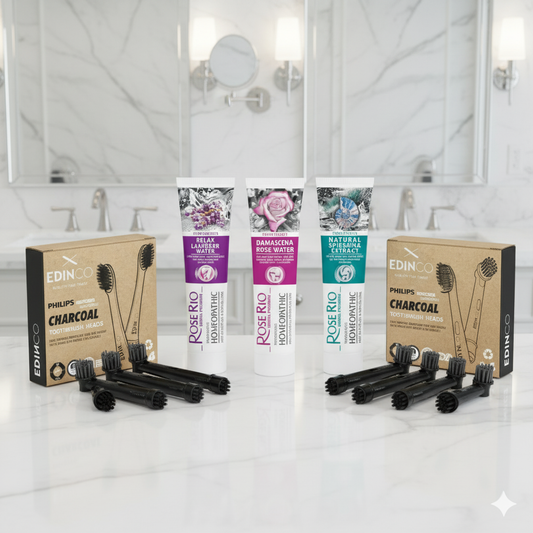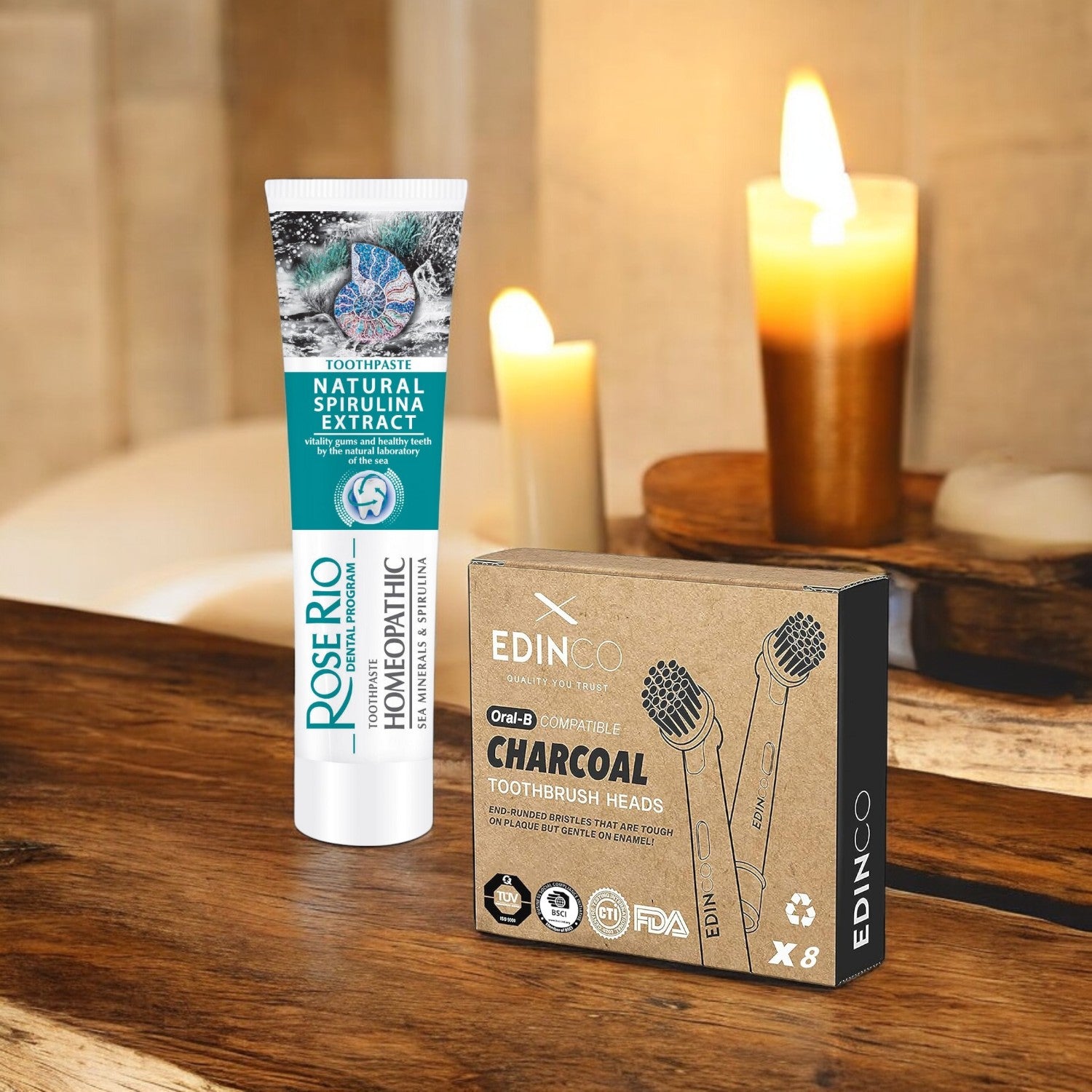What’s Better for Your Oral Health and the Planet: Natural Oral Care or Traditional Chemical Rinses?
Table of Contents
The mouthwash has always been a common item in the bathroom cabinet, placed as the final, bactericide step in daily oral care. However, to the conscientious consumers, the convenient option is not the right option anymore. The question is clear-cut: either you go with a classic, chemically aggressive rinse that may be based on harsh chemicals and significant amounts of plastic material, or you invest in an all-naturally made, science-based routine that makes systemic health and a circular economy a priority.
The founders of Edinco, a British company brand developed by British dentists and engineers from leading UK universities, are committed to providing intelligent, evidence-based oral care alternatives. We operate with the motto: Everyday healthcare without everyday waste. In our opinion, the basis of a better routine is the quality of your brushing and the honesty of your tooth paste- not the blind efficacy of a hard rinse. This definitive article dissects the science, safety, and sustainability of both methods, proving why a quality, sustainable tool like ours is the most clinically-proven way to a better smile and a cleaner Earth.
Why is Mouthwash Such a Big Deal?
Mouthwash is the stuff you swish around in your mouth to add a little zowie to your oral care, but it is not a miracle. It is not intended to substitute for brushing and flossing.
How Does It Actually Help?
It’s quite convenient to electrically shock some of the bacteria that form plaque and gingivitis, clean your breath by addressing odorous substances, and even provide your gums with beneficial substances such as fluoride or calming compounds. Imagine it is a sidekick, which makes its way in and around the crevices where your toothbrush cannot reach. The trick, however, is that it only lasts about 30-60 seconds before you need to spit it out, meaning that the time consumed by it on your teeth is minimal in comparison to the time spent by toothpaste.
What’s Inside Those Commercial Bottles?
The majority of conventional mouthwash is filled with ingredients such as alcohol (that painful stinging sensation you experience), chlorhexidine (a germ-killing, heavy-duty agent used sparingly by dentists), synthetic colour to make the mouthwash appear pretty, and occasionally added fluoride. These ingredients sound great but there are some pitfalls to them in the event that you use them excessively.
Why are Dentists so Ambivalent?
Mouthwash is a hit with some dentists who prefer it as a quick fix, such as after surgery, or when one has a bad gum problem. However, others particularly in the UK argue that taking it daily may do more harm than good, The NHS agrees, suggesting it’s better for short-term fixes. The reason? Those powerful chemicals may disrupt the natural balance of the bacteria in your mouth, causing it to be dry and irritated, which could even end up causing more cavities in the long-term. It is a head-scratcher, isn’t it?
Natural vs. Traditional What is the Real Difference?
The big divide here is about how these products treat your mouth. Traditional ones go all-in with chemicals to kill everything, while natural options try to work with your mouth’s own defenses.
What Is In Traditional Products, and Do You Have Reason To Be Concerned?
Most conventional mouthwashes are usually high in alcohol and dry you out, they are packaged in non-recyclable plastic containers crowding landfills and they even contain artificial sweeteners or dyes which some are sensitive to. Most effective though it may be, Chlorhexidine will leave your teeth stained in the event you apply it excessively.
What is so Special about Natural Oral Care?
Natural care is all about nature and ingredients that are doing something helpful. Consider alternatives to sugar, such as xylitol, which inhibits cavity-forming bacteria, or botanicals like chamomile, which relaxes your gums. These are not randomly chosen to appear on a label, and they omit the bitter stuff to make things soft but work.
Where Do They Rank in Sustainability?
Glass or recyclable packaging is also a plus to the planet because many natural products are packaged in that way. Traditional ones, though? The majority of the bottles are mostly plastic, which is difficult to recycle and becomes waste. You can see it’s a distinction when you are concerned about reducing your eco-footprint.
Is Natural Oral Care a Science?
And a green-leaning person will want to know whether it works, and the answer is yes, with some shading.
Do Natural Ingredients Work to Fight Plaque and Bad Breath?
Absolutely. Research indicates that xylitol reduces the number of bacteria that decay the teeth, and certain essential oils such as peppermint may also freshen your air by addressing the causes of odor. Not as violent as a chemical rinse, yet clever and specific.
What Do They Do with Certain Problems?
Natural teeth whiteners can whiten teeth without harsh chemicals, calm sensitive gums using anti-inflammatory plants, and prevent cavities using xylitol, rather than fluoride. They do not work so well with heavy tartar, but then the brushing and flossing still shine.
Are There any Disadvantages of Traditional Rinses?
Yes, and they’re worth noting. Alcohol will eventually dry your mouth and cavity formation becomes easy. These powerful antiseptics may also interfere with the good bacteria your mouth requires and this may not only affect your teeth. As many as have complained of irritation by dyes or alcohol, but no cancer connection has been established.
How Do These Choices Affect the Planet?
This is where it gets interesting for the eco-minded.
What’s the Damage from Traditional Products?
Those plastic mouthwash bottles add up fast. With millions of tonnes of plastic waste in the UK alone, non-recyclable packaging from traditional brands is a big culprit. WRAP says the UK’s dealing with over 2 million tonnes of this stuff yearly—wild, right? It’s a cycle that keeps harming our environment.
Why Are Natural Options Greener?
Natural brands use biodegradable or recyclable materials, like glass, and focus on ethical sourcing. It’s a step toward less waste and a healthier planet, which feels good if you’re trying to make a difference.
What About Packaging?
Natural care often swaps plastic for glass or compostable options, making disposal easier and reducing landfill clutter. Traditional products lag behind here, sticking to those bulky plastic designs.
What Should You Think About When Choosing?
Your pick depends on what matters to you.
What Do You Need for Your Teeth?
If it’s fresh breath or sensitive gums, nature might be your friend. For tough plaque, traditional could help, but use it wisely.
Any Ingredients to Avoid?
If you’re dodging fluoride, SLS, or artificial colors, natural routines are a better fit. It’s all about what feels right for your body.
Do You Care About UK/EU Made or Charity?
Products made in the UK & EU with high work ethics and charitable causes might appeal if you value local quality and giving back.
Eco-Packaging a Must?
Go for options with zero-waste or recyclable packaging to keep your carbon footprint light.
What Do Experts Say?
Dentists are starting to see both sides.
Are Natural Options Gaining Traction?
UK dental groups, like the British Society of Dental Hygiene and Therapy, are warming up to natural choices for eco-friendly folks, focusing on how you use them.
What About Holistic Views?
Holistic dentists love natural ingredients for keeping your mouth’s bacteria in check, which ties into overall wellness—a nice bonus.
The Bottom Line: Which Way to Go?
So, what’s the verdict?
What’s the Evidence Telling Us?
Natural care wins for eco-friendliness and gentler health effects, while traditional rinses pack a stronger punch against plaque—though with risks. The real key is building a solid routine, not leaning too hard on mouthwash.
How Do Your Values Play In?
If you’re all about sustainability, nature is your path. Need heavy-duty cleaning? Traditional mouthwashes can step in occasionally.
Can You Mix and Match?
Sure! Use natural daily and save traditional rinses for specific issues—like a smart, balanced plan.
Meet Edinco: Your Sustainable Oral Care Ally
If you’re ready to make a change, Edinco might be your answer. Founded in August 2019 by British dentists and engineers from top UK universities, we’re based in London with a mission: Everyday healthcare without everyday waste. Our focus? High-quality, eco-friendly oral care that skips the chemical overload.
-
Recyclable Charcoal Toothbrush Heads: Snap these onto your Oral-B or Philips Sonicare for less plastic waste.
-
Fluoride-Free Toothpastes: Enjoy organic lavender for a calming clean or organic rose for sensitive gums, both powered by xylitol for cavity protection.
We go further with our Recycling Reward Scheme—send any brand’s used oral care items us, and we’ll cover postage with a voucher you get instantly online. Plus, our ethical sourcing and charity donations to health, education, and food causes show our hearts’s in it.
Start your journey:
-
Brush: Subscribe for discounted, timely toothbrush heads.
-
Nourish: Pick lavender or rose toothpaste.
-
Floss: Add biodegradable floss and a natural rinse (will be available soon)
Choose a smarter oral future with our foundational tools: Shop Edinco Toothpaste and Brush Heads →
FAQs
1. What mouth rinse do dentists recommend?
Dentists typically recommend alcohol-free rinses with enamel-strengthening , cavity-fighting or antimicrobial properties. These help prevent cavities, reduce plaque, and maintain gum health. Natural rinses with proven ingredients like aloe vera, green tea, or xylitol can also be beneficial if used consistently.
2. What is the best natural mouth rinse?
The best natural mouth rinses often contain herbal ingredients such as peppermint, chamomile, clove, or neem and xylitol. These ingredients can reduce bacteria, freshen breath, and soothe gums without the harsh chemicals found in traditional mouthwashes.
3. What is the best oral health care routine?
A strong oral health routine includes brushing twice daily with fluoride or fluoride-alternative such as xylitol or remineralising toothpaste, flossing once a day, and using a suitable mouth rinse. Regular dental check-ups and minimizing sugar intake also play a key role in keeping teeth and gums healthy.
4. What is the best thing to rinse your mouth with?
Herbal or natural rinses with antibacterial or anti-inflammatory properties are recommended. Ingredients like green tea, aloe vera, or saltwater can help maintain oral hygiene while being gentle on the environment.
5. Are homemade mouthwashes effective?
Yes, homemade mouthwashes using ingredients like peppermint oil, clove oil, neem, or baking soda can help reduce bacteria, fight bad breath, and soothe gums. However, they should be prepared carefully and used as part of a full oral care routine. The downside is the taste and lack of remineralising ingredients.
6. Can natural mouthwash help with gum disease?
Some herbal mouthwashes, especially those with rose, neem, clove, or aloe vera, can support gum health and reduce inflammation. While they may help prevent issues, professional treatment is necessary for severe gum disease.
7. What are eco-friendly alternatives to traditional mouthwash?
Eco-friendly alternatives include herbal, alcohol-free, and refillable or zero-waste mouthwashes. Powdered or tablet-based mouth rinses are also growing in popularity as sustainable options that reduce plastic waste.


